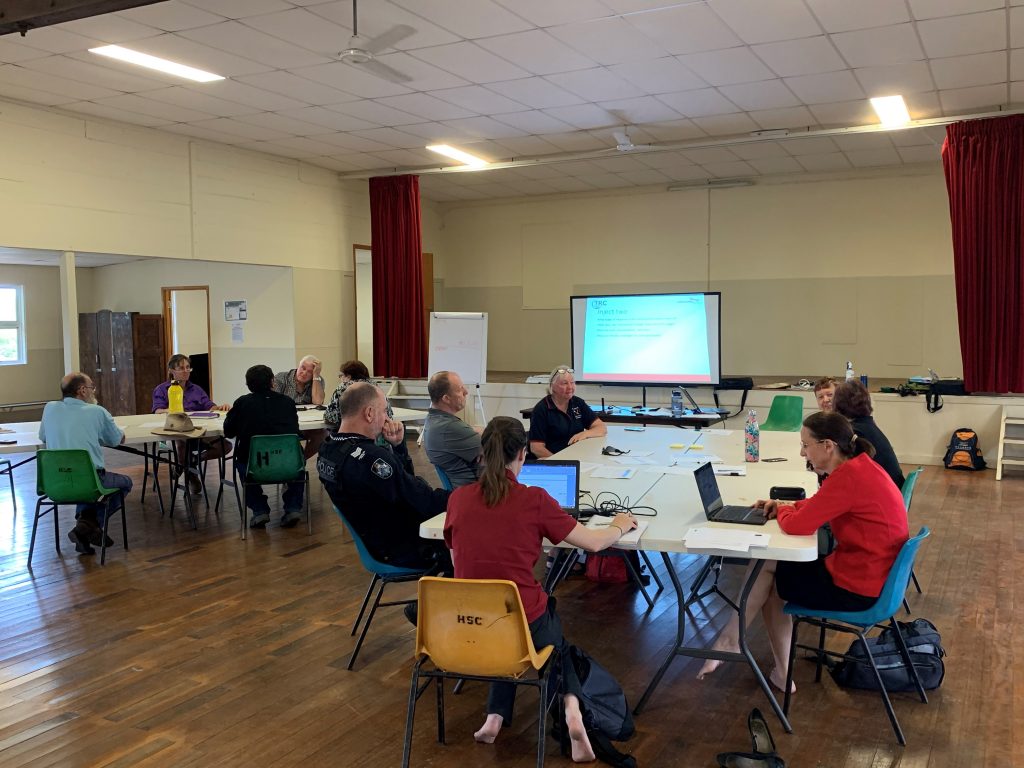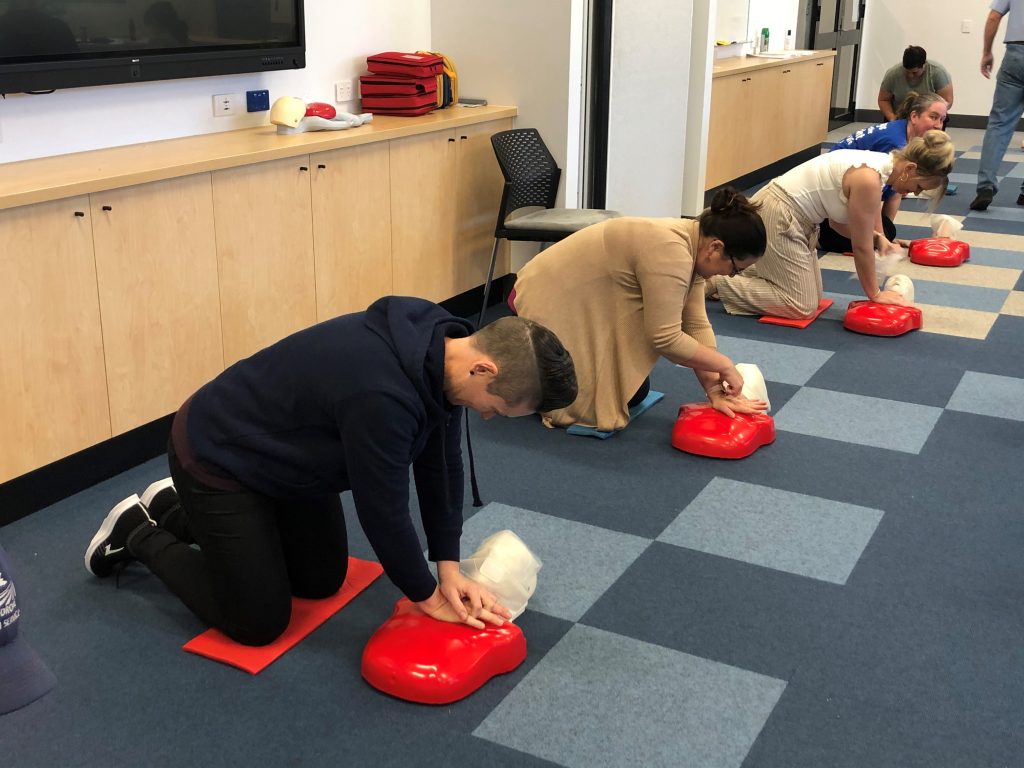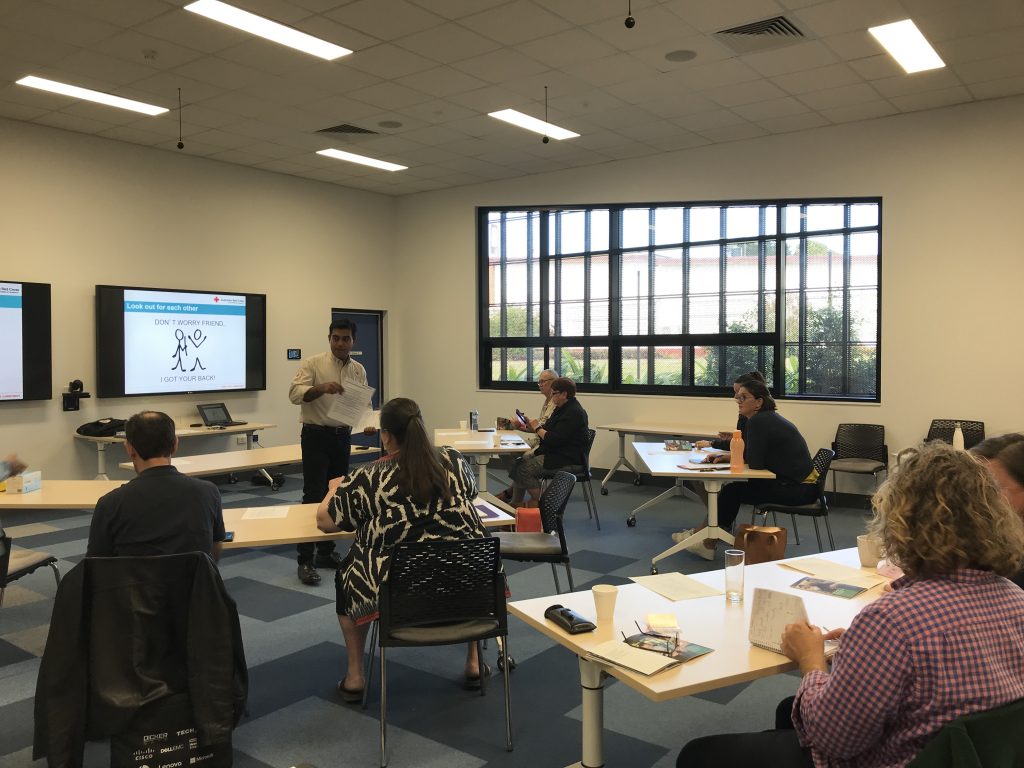Foundation for Rural & Regional Renewal (FRRR)
Following the February 2022 floods and the devastation experienced by community members within and surrounding Kin Kin, in southern Queensland, the Kin Kin Community Group (KKCG) shifted its focus towards future planning and the inevitable impacts of another natural disaster on their community. They aim to be better prepared with improved emergency systems to enable their people to operate more efficiently and effectively.
Kin Kin is a secluded southern Queensland hinterland community situated in the Noosa Council area, near its boundary with the Gympie Council. The town has very limited essential services, with only a single general store and café. The February 2022 floods took the town by surprise and left the community fending for themselves. There was no community-friendly meeting place or emergency response centre and the community was cut off by floodwaters for days. No one could enter or leave except by a helicopter from the oval. Food supplies depleted rapidly and communication was hampered, leaving the community in the dark about the ongoing situation. For four days there was limited telecommunication, making the community members feel even more isolated.
KKCG is dedicated to representing and promoting the Kin Kin community, and it was to this organisation that the community turned during their time of distress. The Group operates on behalf of the community, seeking opportunities, positive change and growth for its people. The volunteers are doing all that they can to ensure the community is prepared and supported for the future.
The effects of the 2022 flood events underscored the need for an Emergency Response hub, a place where volunteers and community can gather, to connect, communicate and plan together. The situation also highlighted the scarcity of resources available to support volunteers, including drinking water and first aid equipment. It emphasised the community’s risk areas and disadvantages, illustrating the need for better preparedness in the future.
Fortunately, the KKCG received a grant of $25,000 from the Rebuilding Futures program, funded by the Suncorp Group. This enabled the KKCG to purchase equipment and carry out activities to enhance the community’s safety, connection, resilience and wellbeing. This includes establishing a community hub that is publicly accessible at all times, including during natural disasters, and serves to provide comfort, connection, safety and distribution of essential resources within the community.
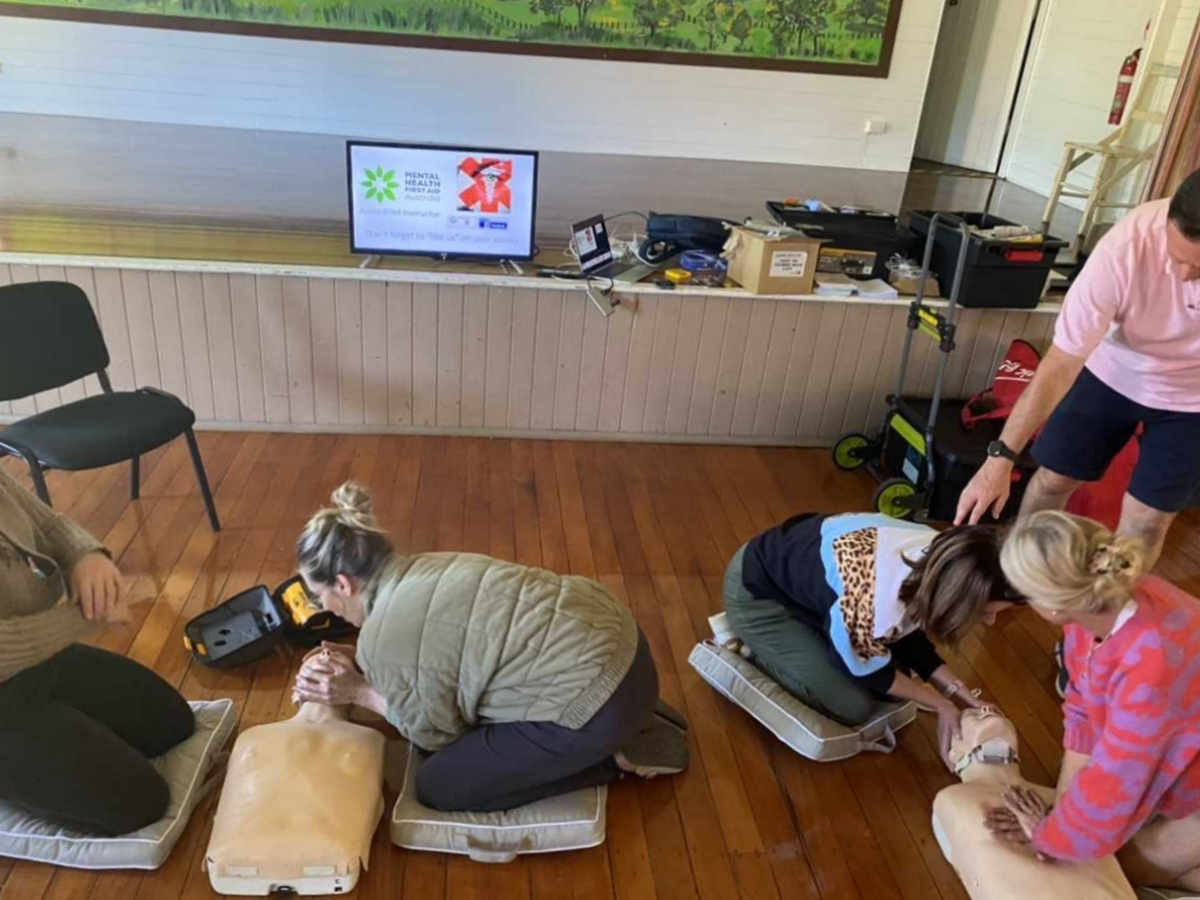
Specifically, the funds went toward essential office equipment such as computers, phones, an air conditioner, a printer, WiFi, first aid kit, a defibrillator, an emergency water supply and a community noticeboard. These resources aid in improving communication and growth within the community. The notice board displays disaster information and preparedness material from the Council and the Queensland Government, designed to better inform the community about disaster preparedness strategies. Furniture was also purchased, to make the space usable for community workshops and events that foster wellbeing and community connection. A recent example of such an event was a free first aid training day hosted by the KKCG. This workshop equipped volunteers with the skills to use the new first aid equipment and defibrillator in case of an emergency.
To combat volunteer fatigue and acknowledge the efforts of the Kin Kin volunteers, a ‘Volunteer Care Program’ was established. This program involves a monthly wellbeing initiative, allowing volunteers and community members to come together and connect. It bolsters the resilience and spirit of the community, fostering a sense of belonging and readiness to support others in times of need. The Community Hub is now equipped to meet the needs of the community in times of distress, with essential community resources and communication strategies focussed on supporting the overall health and wellbeing of the community. The hub, and volunteers who dedicate their time there, ensure that the local people, environment, culture and celebrations are embraced, fostering goodwill and prosperity. Indeed, it is the people and volunteers who have made Kin Kin an even more appealing and positive place to live.
The work of the Wardell Community Organised Resilience Effort (CORE) is an example of how a small town can rally in the face of a natural disaster and be ready for disasters to come. Most days, Wardell is an idyllic spot to live. Lush, green and quiet on the banks of the Richmond River in the Northern Rivers region of NSW. But in 2022, floods devastated the town and others nearby. Wardell had never flooded before, and no one was prepared.
Wardell CORE was set up as a resource centre for emergency donations. Bedding, blankets, clothes, food, medical supplies, water, torches, batteries and tents were all gratefully received. The need was immense. Two years on, Wardell CORE’s primary purpose is still helping affected people. Some are still homeless and many struggle with mental health issues, including PTSD. Their other main aim is to make sure the community is never impacted in the same way again.
Planning for the way forward
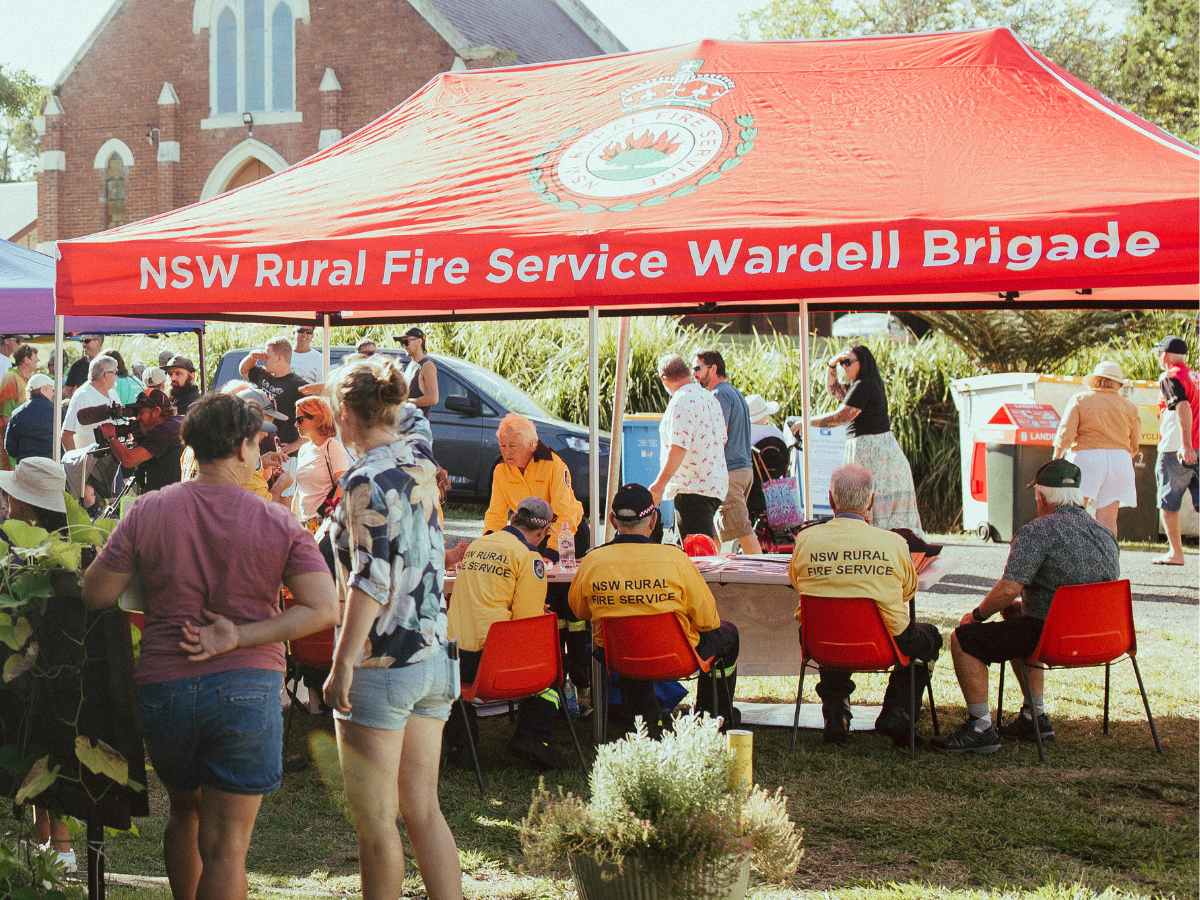
During the 2022 floods, mobile and internet telecommunications were impacted, meaning Wardell and the surrounding communities had limited or no communication in many areas until power could be restored or services fixed. Having no communications during a disaster created all kinds of problems – the emergency services people couldn’t share vital information, residents were cut off from family and friends, and there were any number of complexities around ongoing recovery.
After the flood receded, Wardell CORE immediately started planning for the next one, and detailed planning identified a need for a way for the community to stay informed, given the power outage lasted for two weeks or more. CB radio was the solution. They received a $10,000 grant from FRRR through Telstra’s Connected Communities program that funded the purchase of 10 hand-held devices and two base stations, as well as funds left over to support the community with the appropriate training. Through additional fundraising, they were able to install a relay station that helps to extend the signal as far as possible to provide radio reception throughout town and with the nearby communities of Woodburn and Coraki up-river, and Ballina down-river.
Where to next?
The organisation plans to distribute more radios throughout the region to anticipate flood events as widely and comprehensively as possible. Another resilience move they made was installing a Starlink service that uses a network of satellites to provide internet coverage, and installing onsite battery storage so that they will have internet in the event of future power outages.
The team behind Wardell CORE recognises that locals in the region experience high levels of anxiety about weather events, but the low level of digital literacy in the community is a real barrier to disaster preparedness. To resolve this, they’re looking at establishing a program that teaches people how to access and interpret weather apps and other related platforms.
A spokesperson for Wardell CORE explained the impact of the grant they received.
“Without the FRRR grant from Telstra’s Connected Communities program, we would never have been able to put our disaster preparation plans into action. The lessons learned from the 2022 floods meant we knew what technology we needed and where it should be located. But our reliance on small donations meant we could never have afforded it. Now we have the communications we need to feel confident about our ability to protect our people, physically and mentally, from any flood events in the future.”
With more than two metres of rain falling across Far North Queensland in the last few days, communities are now facing an unimaginable clean up and recovery journey ahead.

After working alongside disaster-affected communities for more than 20 years, we know that the small, remote communities in this region will need support in their recovery over the medium to long-term. That’s why FRRR is launching a Flood Recovery Appeal.
While the extent of the impact is still unfolding and immediate response needs are being coordinated, once that support has ceased, in about 12-18 months, there will still be significant community-level needs still to be addressed. Those will evolve over the coming years too – moving from a focus on physical things that enhance safety in the event of a ‘next time’, to helping address volunteer fatigue and eventually supporting general community wellbeing, economic recovery and organisational capacity building.
Our role – with the support of our partners – is to be there as they move through this journey, offering patience, continuity, flexibility and agility to move how and when the community is ready – with fit-for-purpose funding and resourcing support.
That’s why FRRR established the Disaster Resilience and Recovery Fund (DRRF) in 2019 – to ensure that we can support grassroots community organisations across remote, rural and regional Australia that often miss out on receiving funds donated for disaster recovery.
This Fund ensures that FRRR can support recovery when the community is ready, usually long after the headlines have faded. It also funds preparedness initiatives so that communities are in a better position to recover from a disaster event. Funds are invested with the returns used to fund grassroots groups to implement the recovery initiatives that they prioritise, long after immediate response and relief funding has ceased.
Alternatively, donations can be made directly to the Prepare & Recover stream of FRRR’s small grants program, SRC, which provides grants of up to $25,000 to communities impacted by disasters. Our supporters are able to nominate that they would like their funding to be directed to supporting communities impacted by a particular disaster, such as TC Jasper.. We report regularly to our supporters and, for significant donations, can trace contributions through to the specific projects that funding has made possible.
Taking a holistic approach
At FRRR, we view disasters as environmental shocks that remote, rural, regional communities regularly experience. We know they are increasing in frequency and severity; what makes them complex is not knowing when they will occur, where, or the severity and nature of their impact.
In operational terms, FRRR has a standing disaster philanthropy model that we scale when a major disaster occurs. Each year, with support from hundreds of donor partners, we provide grants and capacity support to around 600 remote, rural and regional places across the country via almost 1,200 grants. This reach gives us a good footprint and connection points that we can naturally tap into when disasters occur – and it means we are building on the resilience and capability that has been built up in between disaster events.
Recovery and preparedness efforts depend on the social ties, quality of community infrastructure, depth and breadth of skills and networks, cultural knowledge, and the health of local service systems, not-for-profits and community groups. FRRR’s approach is to balance funding for recovery and preparedness to support people and community-led processes as well as infrastructure and equipment. This approach enables improved outcomes as communities move through their recovery and aims to support needs now and as they evolve.
If you’d like to know more either about our approach or how you can help, please get in touch with us via info@frrr.org.au or partnerships@frrr.org.au.
18 community groups to receive funding
In partnership with Suncorp and AAMI, FRRR has awarded $300,781 to 18 remote, rural and regional not-for-profits (NFPs) in Victorian communities impacted by the flooding events that took place between October 2022 and January 2023.
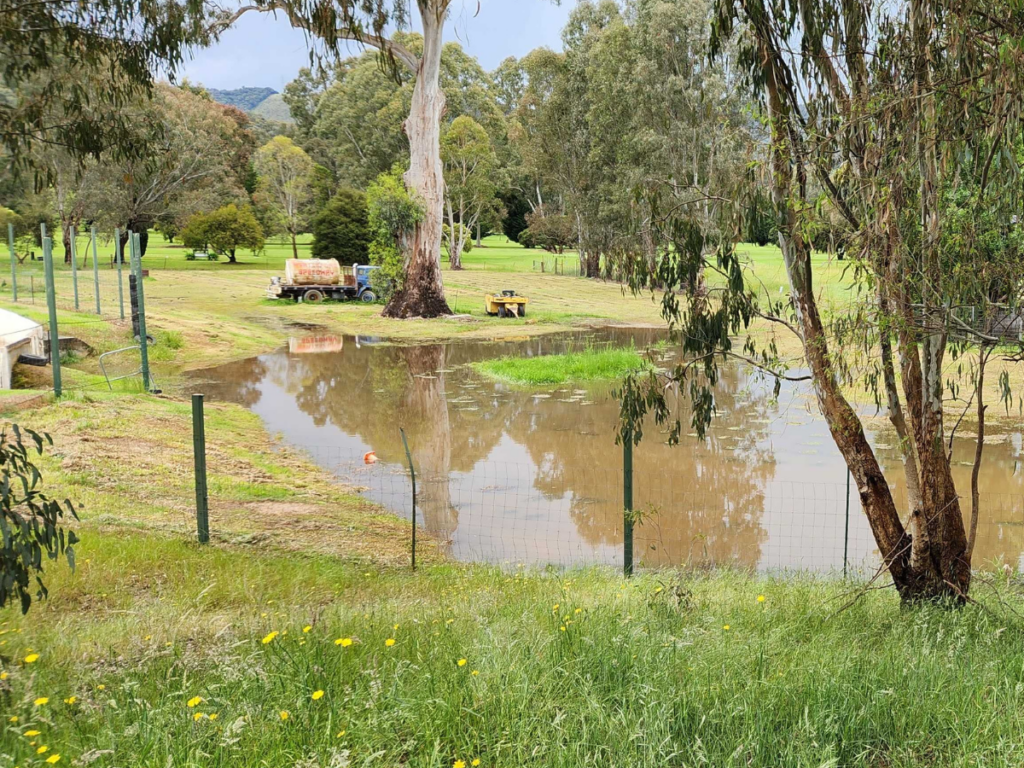
Suncorp Group pledged $1 million to FRRR in 2021 for a dedicated Rebuilding Futures program – to support Australian communities impacted by significant natural disasters.
This is the third round of the Program and with these grants will have distributed over $1 million.
The grants awarded range from $4,040 to $20,000 and will be used for a range of projects from building community infrastructure and improving emergency facilities, to youth activity programs and community workshops – all high-priority projects for their local community.
Suncorp Group CEO Steve Johnston said the grants would help support community-led recovery in the impacted areas.
“Australia is no stranger to natural disasters and unfortunately I’ve seen all too often the devastation and emotional toll they have on our communities,” Mr Johnston said.
“That’s why we are supporting affected Victorian communities through the Rebuilding Futures program – to not just build back but to build back better than before, making them even more resilient,” he said.
“These communities have been through a lot, and we know that recovery from severe weather events can sometimes take years. We also know that each community’s priorities during that recovery is different.
“We’re pleased to provide support to a range of different community groups and local not-for-profits that are run by people who know and understand what it is their community needs in order to rebuild.”
Nina O’Brien, Disaster Resilience and Recovery Lead at FRRR, said this round of grants is further confirmation of the long-term impacts of natural disasters.
“In this round of grants, we’re seeing projects that are about building community amenities and improving infrastructure but there’s also an emphasis on initiatives that are about building community resilience and promoting social wellbeing. It’s nearly a year since the floods first started and so this just goes to show that the impacts of floods are long-lasting and go far beyond the physical damage that’s caused.
“The floods have had a huge emotional toll on the people in these communities, yet they’re still determined to build back and become even more resilient than before, which really is inspiring to see. Thanks to the generous support of Suncorp and AAMI, we can help them to do just that,” said Ms O’Brien.
Among the 18 projects funded this round are:
- Alpine Multi Skill Group in Bright – Construction of a dedicated cabin workspace for volunteers, members, and the local community, which will support Alpine Multi Skill’s community development work and collaboration with the Men’s Shed – $19,750
- Echuca Moama Broadcast Service Inc in Echuca – Upskill the community radio volunteers, enhancing their ability to broadcast during and outside times of emergency disasters to support community safety and wellbeing – $4,040
- Kerang and District Community Centre Inc in Kerang – Build resilience in Kerang through an inclusive arts program aimed at connecting people through positive creative activities – $10,000
The full list of grant recipients and their projects is below.
| Organisation | Project | Location | Grant | |||
|---|---|---|---|---|---|---|
| VICTORIA | ||||||
| Alpine Multi Skill Group | Construction of a Dedicated Cabin Workspace for Volunteers, Members and the Local Community Expand the opportunities for community skills and preparedness activities through constructing a cabin to support Alpine Multi Skill's community development work collaborating with the Men's Shed. | Bright | $19,750 | |||
| Boys to the Bush Ltd | Boys to the Bush Building up Rochester Boys Support youth recovery and resilience through extra curricular programs developing life skills, experience of rural employment opportunities, community engagement and mentoring. | Rochester | $20,000 | |||
| Campaspe Park Raceway Committee of Management Incorporation | Disabled Access from Car Park to Clubhouse Improve access and community facility infrastructure with a concrete path from the carpark to clubhouse of the Campaspe Park and Raceway Recreation Reserve. | Echuca | $7,600 | |||
| East Loddon Food Share Program Incorporated | Relief Food and Fridge / Freezer Storage Build capacity of local food relief organisation with whitegoods, a generator and food supplies to support a 12 month program of food security. | Dingee | $15,699 | |||
| Echuca Moama Broadcast Service Inc | Upskill Broadcasting Team Build skills and capability for community radio volunteers to broadcast during and outside times of emergency disasters to support community safety and wellbeing. | Echuca | $4,040 | |||
| Eildon Events Inc | Construction of a Permanent Waterproof Cantilever Shade Structure Build capacity of the Eildon community with a cantilevered shade cover for a stage to increase usage and expand local activity. | Eildon | $20,000 | |||
| Greater Shepparton Foundation Limited | Giving Power Greater Shepparton Support community adaptation for long-term social and economic recovery through a collaborative scoping project to develop an accessible solar program for flood-impacted households in Greater Shepparton. | Shepparton | $20,000 | |||
| Kerang and District Community Centre Inc | Let's Connect via Art Build resilience in Kerang through an inclusive arts program aimed at connecting people in positive creative activities. | Kerang | $10,000 | |||
| Mount Alexander Shire Council | Creative Resilience Lab Build community resilience and preparedness through a future thinking workshop with a broad range of Mount Alexander community stakeholders. | Castlemaine | $20,000 | |||
| Myrtleford Recreation Reserve Committee of Management | Myrtleford Recreation Reserve Stormwater Management and Drainage Design Improve local recreation reserve through design of a stormwater management system to mitigate future flood risk, supporting community facility use for local events and organisations' activity. | Myrtleford | $20,000 | |||
| Navarre Public Hall | Revitalising the Navarre Public Hall Rebuild community infrastructure with contributions for rewiring and improved vent systems in the Navarre Hall restoration following significant flood disruption to the community. | Navarre | $20,000 | |||
| Open Door Neighbourhood House Inc | Connecting Community - Social Prescribing Build community resilience through implementing a 'social prescribing' program of connection for vulnerable members of the flood-impacted community of Wangaratta. | Wangaratta | $20,000 | |||
| Parklands Albury Wodonga Limited | Creating Nature Play Trails to Grow Resilience Build community resilience with enhanced community nature space and programs for intergenerational connection. | Wodonga | $20,000 | |||
| Pyramid Hill Neighbourhood House Inc | Communications Kit Build community resilience and capability through upgrading online and offline media communications to support the Pyramid Hill community during and outside of disasters. | Pyramid Hill | $13,900 | |||
| Rochester Community House Inc | Bringing the Roar to Rochy (Shire Hall) Upgrade community facilities with a new sound system at the Rochester Community Hall. | Rochester | $19,949 | |||
| Variety - The Children's Charity of Victoria | Replacement and Upgrade of Safe / Secure and Inclusive Play Environment for Echuca Twin Rivers Specialist School Upgrade the playground of the Echuca Specialist School to ensure a safe and flood proof surface for all abilities children from surrounding impacted flood communities. | Echuca | $18,668 | |||
| Yarrawonga Neighbourhood House Inc | YMCLC Community Connection and Resilience Program Boost community resilience with a Social Prescribing program for engaging and supporting vulnerable people in local activities and information to address mental and physical health issues. | Yarrawonga | $20,000 | |||
| Yea Community Service Group Inc | Hands on Skills for Community Build community resilience with a program of workshops teaching 'sufficiency' skills, including preserving foods, composting and dehydrating, with community connection a key outcome. | Yea | $11,175 | |||
“The NRCF Board and staff certainly value the long-term relationship with FRRR, which is so important to us as a rural and regional Foundation. The support for NRCF’s community impact and grants team has been essential to achieve impact in the community.” Sam Henderson, CEO, NRCF
Northern Rivers Community Foundation (NRCF) was established in 2004 to connect people who care with local causes that matter, to improve community wellbeing for the Northern Rivers region of NSW. They have one of the largest footprints of any community foundation in Australia, covering from Tweed to Grafton, from the ocean all the way up past Kyogle, Woodenbong and Casino. NRCF is dedicated to improving the lives of those less fortunate in their community, either from economic circumstances, mental illness, disability, learning difficulties or drug / alcohol addiction. More recently their focus has been to support their community to navigate their disaster recovery journey following bushfires and then widespread flooding events across the region in early 2022.
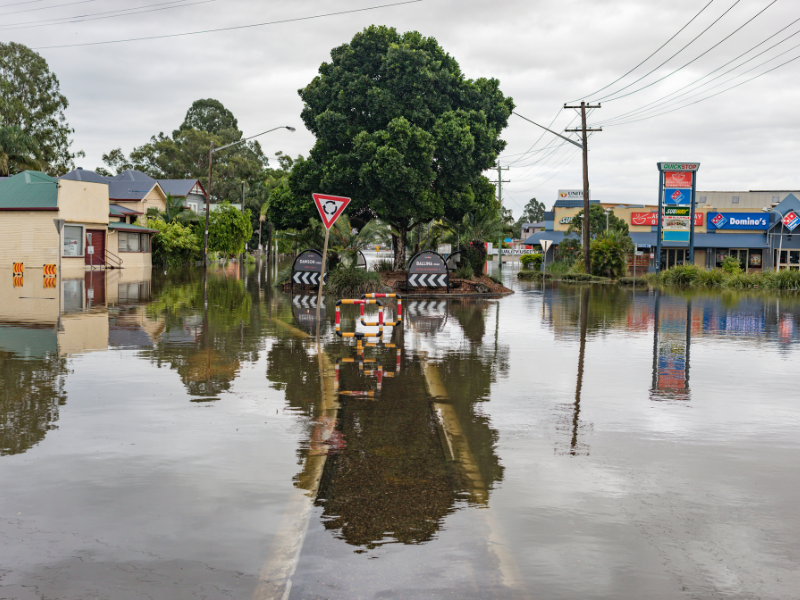
NRCF has held a Fundraising Account partnership with FRRR since 2017 to attract tax-deductible donations, enabling them to help community organisations meet increasing demands on their services and work together to build resilience across the community.
Initially they raised funds through a general Community Fund, and in 2020 established the Resilience & Regeneration Fund to raise funds specifically to support disaster recovery and preparedness in their region. The Fund responds to the increasingly frequent natural disasters affecting the region and the global pandemic. Recognising that these are not isolated events, and that resilience and regeneration are integral to a sustainable and prosperous region, they wanted to attract as much money as possible.
As at 30 June 2023, NRCF has raised $1,171,600 via these two Funds. In 2022, they announced a record distribution of $327,177 to 49 recipients across the seven LGA’s of the Northern Rivers. This was supported by distributions totalling more than $162,000 from their FRRR Fundraising Account in FY22. Projects span across disadvantage, housing and homelessness, recovery and resilience, and the environment.
NRCF will also be looking to use the funds raised through the Resilience & Regeneration Fund to respond in a meaningful and impactful way to the devastation brought about by the two 2022 flooding events that occurred in quick succession through their Annual Community Grants program. Informing their response is their ongoing research project to understand the issues and conditions impacting community recovery with a view to better support local not-for-profits and their activities into the future. In May 2023 they released their second flood impact report ‘Research, Respond, Recover: A year on from disaster’ which offers valuable insights across a range of indicators about how the community is recovering. It highlights gaps in funding for medium to longer term recovery, and ongoing key issues of concern around health and wellbeing, housing and homelessness.
With this increase in support comes a need for increased resourcing. Fortunately, NRCF has also received donations via their Fundraising Account specifically to support their operational and staffing costs through their General Fund. As a result, the role of Grants and Community Impact Manager has been introduced, which will boost their capacity, enabling them to expand their community grant programs and supporting them to broaden their reach.
Sam Henderson, NRCF’s CEO, said ‘The NRCF Board and staff certainly value the long-term relationship with FRRR, which is so important to them as a rural and regional Foundation. The support for NRCF’s community impact and grants team has been essential to achieve impact in the community.’ The need to respond to disasters has now increased so much that they’ve also recruited a part-time Grants Administration Officer to support the Community Impact Manager.
Grants up to $20,000 available for recovery projects
Local community groups and not-for-profits in rural Victorian communities impacted by 2022-23 floods are encouraged to apply for grants up to $20,000 for projects that will support their community’s recovery.
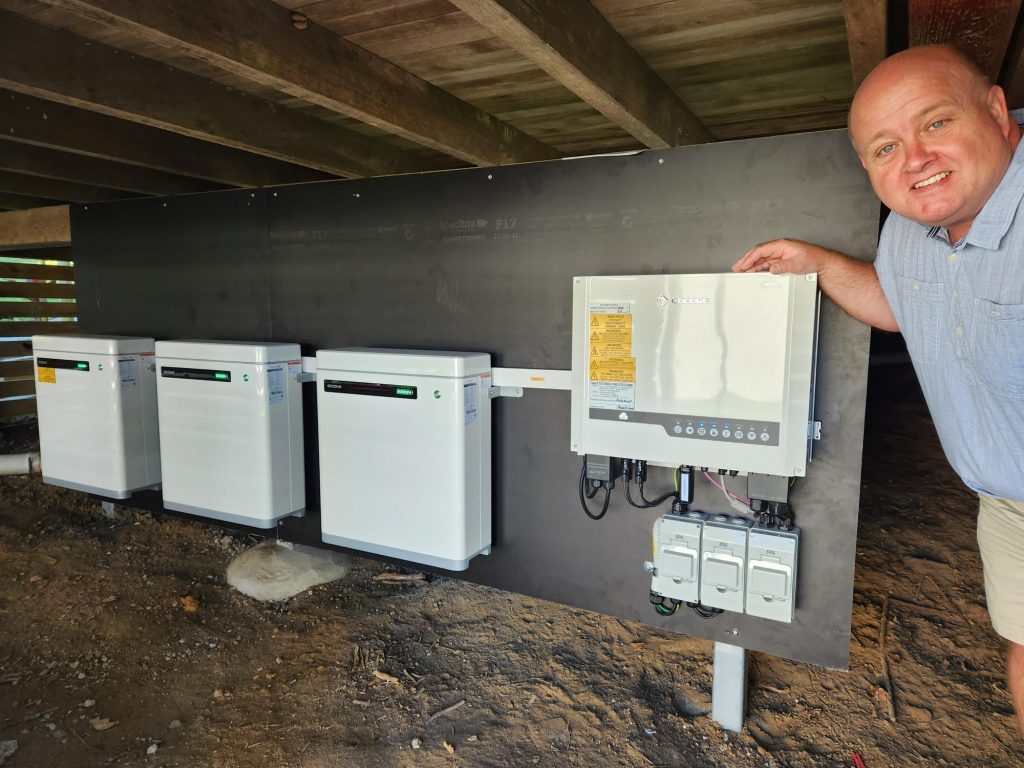
In partnership with Suncorp and AAMI, FRRR is offering $300,000 for initiatives that build resilience and support medium to long-term recovery of communities affected by the flooding and storms that occurred in specified LGA’s between 6 October 2022 and 13 January 2023.
Funded through the Rebuilding Futures program, these responsive grants are available for proactive initiatives that are community-led.
Nina O’Brien, FRRR’s Disaster Resilience & Recovery Lead, said that extreme weather events, like the flooding and storms experienced by rural Victorian regions late last year, affect every community member, especially those who are most vulnerable and rely on community organisations for support.
“Different groups within the community, such as those living with disability, homelessness or who speak English as a second language, will be impacted differently, and as such, will have their own needs in terms of building resilience and how they can prepare for future disaster events.
“We encourage community groups to be inclusive with their initiative ideas and consider how their project can support community members from all nationalities, socio-economic and cultural backgrounds.
“We also encourage community groups to think outside the box when it comes to infrastructure and equipment projects by considering resilient materials and harnessing clever use of design to decrease future impacts of natural disasters,” Ms O’Brien said.
Suncorp’s Group Executive People, Culture & Advocacy, Fiona Thompson, said that natural disasters, such as the Victorian floods, have devastating impacts that are complex, context-driven and long-lasting.
“This is the third disaster-affected region that we’ve supported through this program over the last couple of years, so we know the impacts in each place are different. One thing is always the same though; local people are best placed to know what the needs and priorities of their community, especially following a natural disaster event.
“Thanks to our partnership with FRRR, we’re pleased to be able to provide flexible funding that means communities can determine how best to address the medium to long-term recovery, resilience and preparedness needs and priorities for their region,” Ms Thompson said.
A Grantseeker Workshop, including a Q&A, on the Rebuilding Future’s grant program will be held online from 12 – 1pm AEST, Wednesday 7 June 2023. Register for the Grantseeker Workshop here.
Applications close 6 July 2023.
Previous projects funded through the Rebuilding Futures program include:
- During the floods in February 2022, Mooloolah Valley, QLD, experienced intermittent loss of power that impacted the community’s access to lighting, hot water and technology. To help the community prepare for future disaster events, the Mooloolah Valley Community Association Inc used a $25,000 grant to purchase and install three batteries that can be used to supply power to the region. The batteries are able to store energy from the Centre’s existing solar panels. The grant also funded fencing to ensure the new batteries are stored safely and securely. Thanks to the community’s resilience and preparedness, the batteries were able to keep the community’s power running during the two electricity outages that Mooloolah Valley has experienced since the batteries were installed.
- Following the NSW and QLD floods in 2021, Mission Australia and Mid Coast 4 Kids partnered to respond to child and youth wellbeing across the Mid Coast region. The partners used a $10,811 grant to deliver training to local community service, health and education professionals, volunteers and parents. Their aim was to ensure they were equipped with the skills to have quality conversations and build resilience to respond to the wellbeing needs of children, young people and their families.
For more information about which regions are eligible, the type of projects that can be funded, and to register for the Grantseeker Workshop, visit our Rebuilding Futures webpage.

FRRR today welcomed a contribution of $150,000 from the Newcrest Sustainability Fund, which will go toward flood-recovery in communities affected by the ongoing flood emergency across the Central West of NSW.
FRRR’s General Manager Partnerships and Services, Sarah Matthee, said that it is great to see corporations who have operations across remote, rural and regional Australia providing significant and tangible support to flood-affected communities.
“Organisations like Newcrest are an important part of the economic and social infrastructure in many remote, rural and regional communities. Their staff live and work in these regions, they understand the challenges that are faced and the support that will be needed. It’s wonderful to have them contributing to our flood recovery appeal.
“This is both a swift, and a slow moving disaster, but it is one that is having an enormous impact across many communities. Recovery will take a long time and each community’s needs will evolve over time. These funds, which will be distributed through FRRR’s Prepare and Recover stream of our Strengthening Rural Communities program, means that funding will be there to support local community groups and NFPs when the time is right,” Ms Matthee said.
Read more about what else Newcrest is doing to support flood-affected communities.
We would greatly appreciate any additional donations to our flood appeal.
Visy has donated $250,000 towards flood recovery in Victoria, contributing to the Foundation for Rural & Regional Renewal’s (FRRR) Flood Recovery appeal.
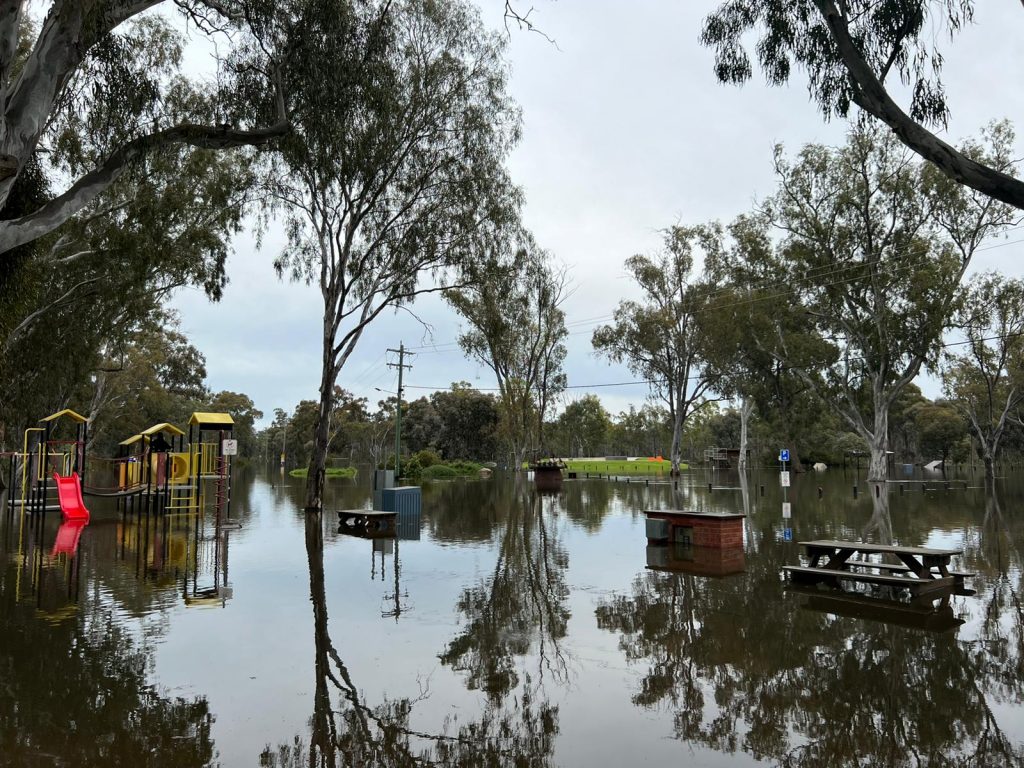
The money donated by Visy, through the Pratt Foundation, will support not-for-profit and community organisations in Victoria’s flood affected regions, helping to meet short-term recovery needs and enabling key backbone groups to keep supporting their communities, as needs evolve.
Visy Executive Chairman Anthony Pratt said the funding would target those areas of the state hit hardest by the recent floods.
“Our hearts go out to all those affected by the floods and we hope this donation helps in the recovery,” Mr Pratt said.
“Natural disasters always bring out the best in Australians, so I encourage anyone who can help to do so.”
The Pratt Foundation has now donated more than $4.7 million to the FRRR since its inception.
FRRR CEO Natalie Egleton welcomed the generous donation, noting it is yet another example of the Pratt Foundation stepping up to help rural and regional communities in Victoria that are affected by disasters.
“The Pratt Foundation has been a longstanding partner and we greatly appreciate them again trusting FRRR to ensure funds reach the small grassroots community-led organisations that will spearhead the recovery in so many communities.
“We continue to see local people helping one another prepare for the impacts of this slow-moving flood and there have been great local efforts in cleaning up. But the impacts of this will be felt for a long, long time both socially and economically, and communities will need a lot of support for a long time to come.
“These funds will be channelled through our Strengthening Rural Communities Prepare & Recover stream. It will also allow our team to work closely with local leaders to ensure funds really get where they need.
“The Prepare & Recover stream is always open, so groups that already know what they need can apply now, or whenever they are ready,” Ms Egleton explained.
Anyone wanting to contribute to the FRRR Flood Appeal can go to www.frrr.org.au/flood-recovery
As thousands of Australians continue to be impacted by floods in Victoria and Tasmania, FRRR is seeking donations to meet the recovery needs of the remote, rural and regional communities that will need help and support in the coming months and years.
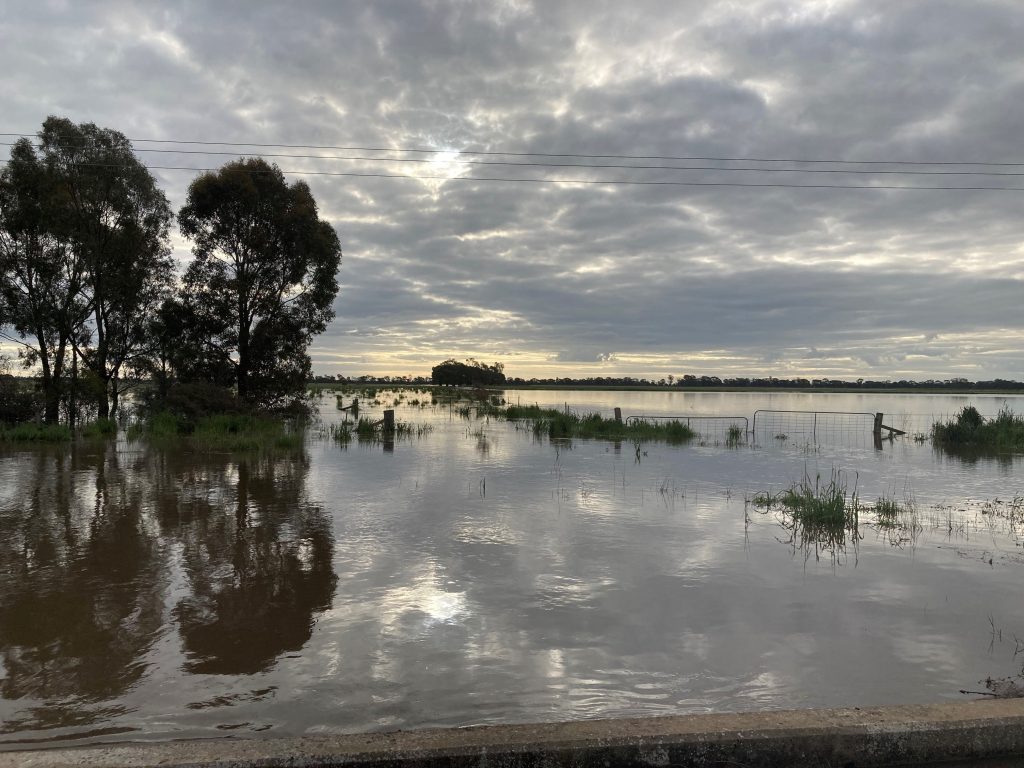
Natalie Egleton, CEO of FRRR, said that the Foundation has already seen local people and organisations once again step up and come together to support one another in the lead up and, as waters start to recede in some places, with the long road to recovery that they have ahead of them.
“The people and places in flood affected regions throughout Victoria, New South Wales and Tasmania will continue to feel the impacts of what’s unfolding for months and years to come. We really can’t stress enough just how big the long term social and economic consequences can be as a result of these kinds of natural disasters.
“Many of these regions, particularly those in Central Victoria, have been through this kind of disaster before, making the current floods all the more traumatic. Many members of the FRRR team themselves have spent the last few days evacuating, helping loved ones to evacuate or have been out sandbagging in their local communities.
“In the last 20 plus years, FRRR has built strong networks and relationships with the people and the community organisations that are being impacted right now and, as always, we’ll be waiting and ready to support them throughout the medium to long term recovery process. Donations to our flood appeal will help to rebuild infrastructure in these areas, address the physical and mental health challenges that occur as a result of this disaster, build the capacity of community groups and strengthen community-led recovery efforts,” Ms Egleton explained.
People can support FRRR’s Flood Recovery Appeal by donating to the Disaster Resilience and Recovery Fund, the Central Victorian Fund or the Strengthening Rural Communities: Prepare & Recover program.
Donations to the Disaster Resilience and Recovery Fund are pooled and invested to ensure that remote, rural and regional communities affected by natural disasters can access flexible, fit-for-purpose funding to support local preparedness and recovery efforts, when it’s needed. For those specifically wanting to support Central Victoria, FRRR also offers the Central Victoria Fund, which continues the legacy of the Central Victoria Community Foundation and focuses solely on that region.
Alternatively, donations can be made to FRRR’s Strengthening Rural Communities: Prepare and Recover program, with FRRR offering one-off, flexible grants through this program to support community organisations in these flood-impacted regions.
FRRR has supported remote, rural and regional communities across the country prepare for and recover from natural disasters since 2006. To date, FRRR has distributed around $46 million for community-led disaster recovery and resilience initiatives.
If you’d like to provide immediate assistance, below is a list of some local organisations that are helping to coordinate support in affected areas:
- Tomorrow Today Foundation – Benalla
- Border Trust – Albury Wodonga Region Community Foundation
- Greater Shepparton Foundation
- Into Our Hands – North East Victoria
- Shepparton FoodShare
- Home – Bendigo Foodshare
- Neighbourhood Houses
- GIVIT
- Rural Aid
- Spontaneous Volunteering – Maribyrnong, Seymour, Rochester, Shepperton and Echuca
Finally, if you would like to volunteer, BlazeAid is currently in the process of recruiting and assembling crews of volunteers.
Since 2006, the Tablelands community in Far North Queensland has experienced three cyclones, floods in 2015, bushfires in 2018 and higher than average monsoonal rains – and the impacts of climate change will likely increase the frequency, duration and severity of these weather patterns and natural disasters over time. With such a small population, this community must be largely self-reliant when it comes to initial disaster responses. So, they need to ensure they are ready when the next disaster strikes.
Thanks to the support of a private donor, the Tablelands Regional Council was awarded a $25,000 grant through FRRR’s Strengthening Rural Communities (SRC) program to run a series of free workshops across the shire. Presented in partnership with Queensland Fire and Emergency Services, these programs were designed to better prepare residents before and during disasters and build resilience for the recovery process.
Seven different workshops were delivered, including First Aid training, Psychological First Aid training, Leadership in Disasters Workshops, Exercise Ready2Respond and Queensland Disaster Management Arrangements (QDMA) training. The workshops aimed to support inclusive and resilient communities, build community capacity and cultivate integrated health and wellbeing. They also helped prepare the community for the impacts of climate change, including more intense weather events in future years.
The funding made it possible for 270 people across the region to participate in the training. In particular, the realistic, scenario-based Community Disaster Team exercise helped the community prepare for the upcoming disaster season. The workshops provided valuable ideas to help families, homes and businesses recover from adversity and many community members provided positive feedback.
Officer in Charge of the Atherton Queensland Ambulance Service, Terry Cumming, felt the training had not only better informed the Atherton community but also alleviated the pressures on Emergency Services during a disaster.
“The effort of getting our community involved in training, and capacity building can only strengthen community resilience and help all emergency services in times of need.”

